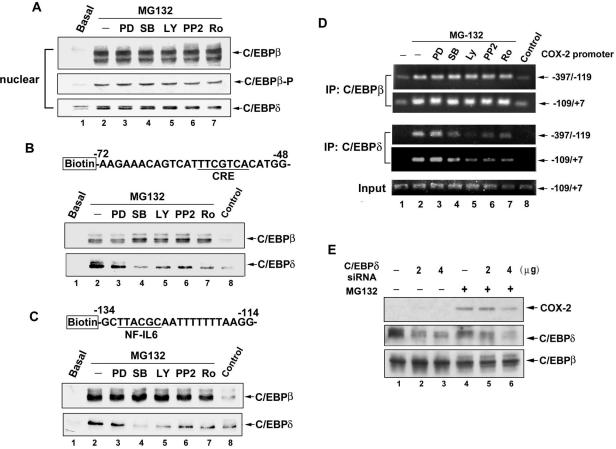Figure 9.
The effects of various kinase inhibitors on the MG132-induced translocation of C/EBPβ and C/EBPδ and their binding to the CRE and NF-IL6 sites. NCI-H292 cells were pretreated with 30 μM PD98059 (PD), 30 μM SB203580 (SB), 10 μM PP2, 10 μM LY294002 (LY), or 1 μM Ro 31-8220 (Ro) for 30 min before incubation with 25 μM MG132 for 1 h, and then nuclear extracts were prepared and subjected to Western blotting using antibodies specific for C/EBPβ, C/EBPδ, or phosphorylated form of C/EBPβ (A) or mixed with biotinylated COX-2 promoter probe containing CRE (B) or NF-IL6 (C) sites or without probe (Control) and streptavidin-agarose beads. C/EBPβ or C/EBPδ in the complex was detected by Western blotting. In D, after cells were treated, ChIP assays were performed using anti-C/EBPβ, or anti-C/EBPδ antibody or without antibody (Control) to assay the precipitated COX-2 promoter regions (–397 to –119 or –109 to +7) as described in Materials and Methods. One percent of the chromatin was assayed to verify equal loading (Input). (E) NCI-H292 cells were transfected with pSilencer 3.1 plasmids expressing scrambled (–), or 2 or 4 μg C/EBPδ siRNA. After 48 h, cells were incubated with 25 μM MG132 for 16 h, and then whole-cell lysates were prepared and subjected to Western blot using antibodies specific for anti-C/EBPβ, anti-C/EBPδ, and anti-COX-2. Results are representative of three independent experiments.

